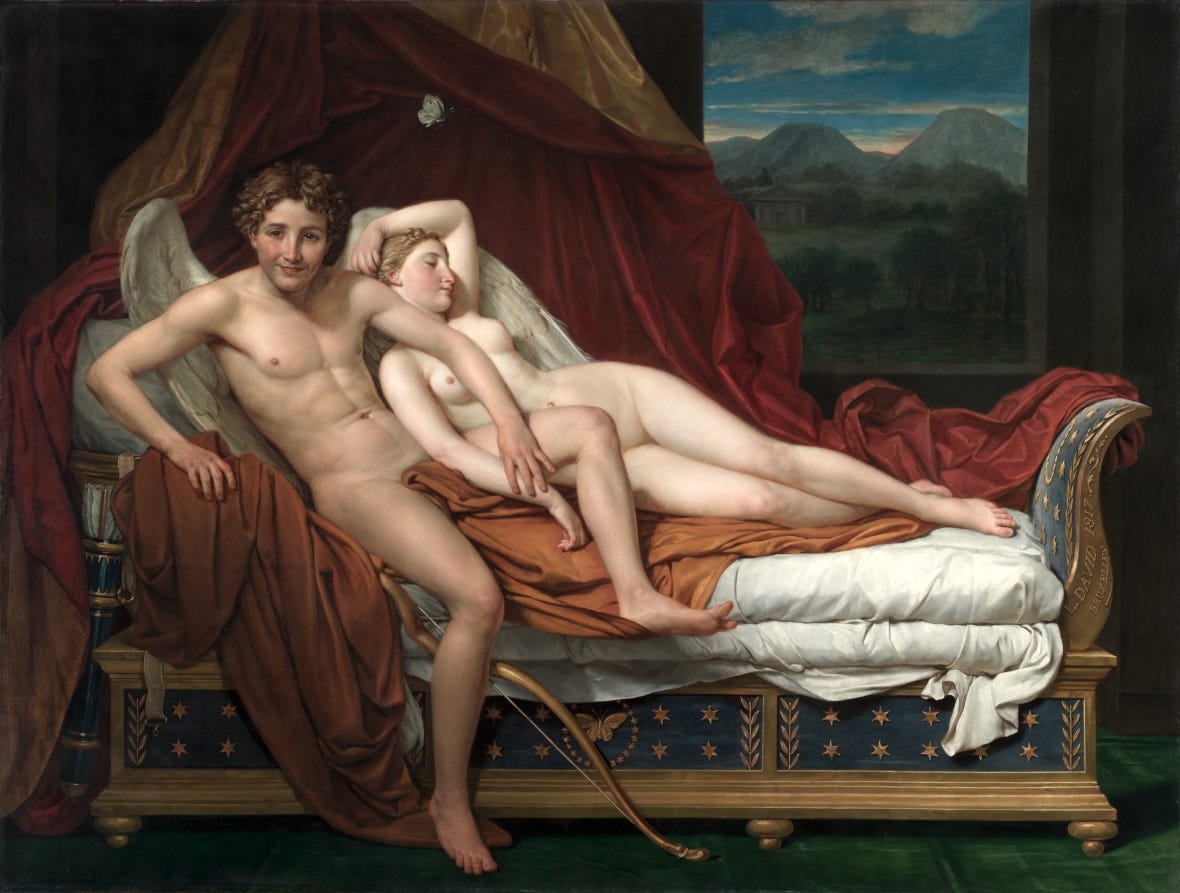Jacques-Louis David, Cupid and Psyche, 1817; I saw this painting in 2017, which seems an unfathomably long time ago. Cupid, here, looks (to me, anyway) a perfect hobbledehoy, albeit one who got the girl to judge by his idiotic grin, which perhaps means he’s not a hobbledehoy at all. I remember seeing this painting, those many years ago, in part because I love Jacques-Louis David and in part because I was surprised to see Cupid depicted not as a chubby baby or young boy but as a hormonal adolescent.
I had never heard the word hobbledehoy until recently. I like coming across words I’ve never heard. There are many, of course—in all likelihood, I’ve already encountered a significant percentage of all the words I’ll ever have to deal with for the balance of my life. But that no one can know every word keeps you humble, I suppose. Anyway, this word, hobbledehoy, is one I especially love.
In The Small House at Allington, the penultimate installment of the Chronicles of Barsetshire, a sextet of novels set in a fictional English county, Anthony Trollope writes of a young man called John Eames. Johnny is a hobbledehoy, alas, which is to say: a clumsy and awkward creature marooned between boy- and manhood. The Oxford English Dictionary calls it a word of “unsettled form and uncertain origin,” conceding that it at least seems to be borrowed from the French, possibly petit gentilhomme campagnard (hmm; I don’t quite hear it) with its implication of apprenticeship or novicehood.
Johnny Eames is sort of Allington’s hero—especially because he gives a proper thrashing to Adolphus Crosbie, the book’s villain—but he’s not quite equal to the task.
There is a class of young men who never get petted, though they may not be the less esteemed, or perhaps loved. They do not come forth to the world as Apollos, nor shine at all, keeping what light they may have for inward purposes. Such young men are often awkward, ungainly, and not yet formed in their gait; they straggle with their limbs, and are shy; words do not come to them with ease, when words are required, among any but their accustomed associates. Social meetings are periods of penance to them, and any appearance in public will unnerve them. They go much about alone, and blush when women speak to them. In truth, they are not as yet men, whatever the number may be of their years; and, as they are no longer boys, the world has found for them the ungraceful name of hobbledehoy.
Don’t mean to quibble with Tony Trollope (I’ve been on a bit of a Barchester bender so feel on a first name basis with its author) but ungraceful?! Hobbledehoy is, sorry, one of the loveliest sounding words I can think of. It’s almost onomatopoeia, if you think of hobble as a the very sound of ungainly walking, which I almost can: the arrhythmic hobble, hobble, hobble of, say, two steps and a cane on a wooden floor. Or picture a foal, only just born, trying to stand up. A wobble, a hobble. Hobbledehoy! I’ve worked this word into conversation dozens of times since learning it. I keep calling my sons hobbledehoys. Thus far, neither has asked me what this means. Maybe its meaning is plain.
*
Current Enthusiasms is a newsletter about things I like. I’ll send it every two weeks.




I will remember this word for the rest of my life.
I love that your boys don't even ask for a definition! Reminds me of when I complain of my own children's recalcitrance on weekday mornings and they never reply with, "What does THAT mean?" I guess context clues are where it's at...